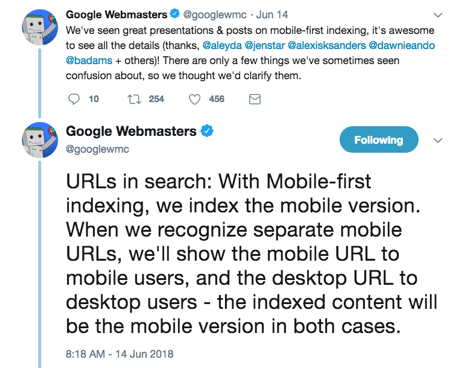But it made the move to primarily use mobile index for search engine result pages (SERPS) because people increasingly search for content on their mobile devices more than on their desktops. What if we don’t have a mobile website? What about our rankings? Your rankings may go up and down but not because of mobile-first. On top of that, Google suggests that having both an m-dot and a responsive website isn’t a good practice. Why risk having some or many of your site’s desktop pages ignored? Yes, Sephora has some good rankings (more on that in a moment), but Google shows far fewer results on a mobile phone as compared to desktops. Some of the mobile ranking results are lower than the desktop, including “marathon petroleum stock” with 3,600 monthly searches (10th on desktop and 14th on mobile) and “marathon gas card” with 2,900 monthly searches (third on desktop and fifth on mobile). What website gets it right? Monitor your website pages with this simple technique: site:yourwebsite.com or site:m.yourwebsite.com You will see the number of pages and documents Google has discovered.

Given your vigilance with the all-powerful search engine rankings, it is reasonable to be concerned about Google mobile-first or at least more curious than usual.
Google recently weighed in, knowing its plan led to confusion. In a series of tweets, Google touched on everything from a problem showing cached pages with mobile-first results to clarifying that “hamburger” menus are fine to use.
But confusion still abounds because of the vast number of websites and worry about natural search engine rankings.
Let’s dive into some common questions to learn whether your website is likely OK, where the biggest problems may surface, and how to keep your rankings in perspective.
Why mobile-first?
Until recently, Google’s index was based on desktop usage of websites. But it made the move to primarily use mobile index for search engine result pages (SERPS) because people increasingly search for content on their mobile devices more than on their desktops. Studies detail the trend likely to grow with the number of search queries and time spent on websites with smartphones and tablets.
The Googlebot Smartphone will visit your website on a frequent basis. Google goes into detail in Best Practices for Mobile-First Indexing and explains it this way on Twitter:

How will we know if our website is part of the mobile-first? Will we see some symbol in the SERPs?
I don’t know about any planned symbols to distinguish some search results from others. But Google has notified many website owners that the sites are indexed with mobile-first.

Again, Google took its time with this change. It even made a point to initially migrate websites that appeared to follow best practices for mobile-friendly indexing.
Our team didn’t get that notice. Does that mean we’ve done something wrong?
It’s a slow transition. You’re not being penalized by any delay. Google chose to single out websites it sees as clearly mobile-friendly. My sense is that Google is notifying site owners in waves to identify and minimize issues.
What if we don’t have a mobile website?
You do.
Some marketers may believe that a formal mobile website is separate from a desktop website – like one that’s distinctive with an “m” like m.worldfamouscontentwebsite.com (also known as an m-dot).
In Google’s view, virtually any website that renders on a mobile device is a mobile site – no matter how poorly it appears on the screen. It could violate scores of mobile-friendly guidelines and still be a mobile website.
What about our rankings? Will they go up or down?
Your rankings may go up and down but not because of mobile-first. Your mobile friendliness is not a ranking signal like the words in an H1 tag, backlinks, or image alt attribute.
Your rankings depend on how you’ve written and coded your website in light of the competition. Google still has only one index and you’re in it. Google didn’t drop all your content into a new world and expect you to adapt.
Will websites be delisted?
No, not because of mobile-first. Sure, you could violate Google’s quality guidelines with some webspam. But the mobile-first switch won’t trigger websites to fall out of favor.
Websites get delisted for tactics like hiding white text in a white background, generating tons and tons of spammy backlinks, and duplicating a website with a second domain name.
Do we need to worry?
From the start, Google indicated many websites would be fine. For example, if you have a responsive website, you’re likely in the clear. If your website can look decent on a desktop, tablet, or smartphone, nothing really changes. You’re good to go.
Who should care?
Be more worried if your website isn’t deemed mobile-friendly. Take Google’s Mobile-Friendly Test – it’s as simple as typing in the URL.
Common problems may be small text, content not sized to the viewport, and buttons or links too close to each other.
If your website falls short, you may not see the impact today. After all, Google insists that mobile-first isn’t a ranking consideration. But if Google is putting this much emphasis on mobile, you should meet mobile standards.
Websites with m-dots could be especially problematic.
Google urged companies to move away from m-dots and embrace responsive websites. Not everyone listened and they could pay a price. On top of that, Google suggests that having both an m-dot and a responsive website isn’t a good practice. It confuses the Google search engine and that’s never a good thing.
John Mueller, webmaster trends analyst at Google, underscored the concern in June on Twitter:

M-dots have disadvantages. For starters, they could have fewer pages than the desktop version. If Google indexes only the m-dot, the site loses in a horrific way.
Sometimes mobile pages are shorter, which means the site has fewer opportunities to rank well for long-tail keyword phrases.
Sure, someone could always navigate his or her way to the larger, desktop…

COMMENTS